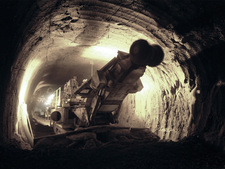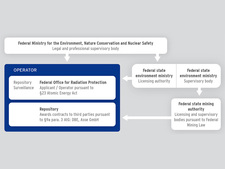Disposal: Protagonists and responsibilities
In Germany there are two repositories and two repository projects for which the Federal Office for Radiation Protection (BfS) is responsible: Morsleben, Asse, Konrad, and Gorleben. While Gorleben is still a mine and no decision has been made so far as to whether radioactive waste will ever be disposed of there, radioactive waste has already been stored in Morsleben and in Asse. Konrad, on the other hand, is currently being converted to a repository and is the only repository so far that has been licensed under nuclear law.

![]() Driving of a gallery with a road header
Driving of a gallery with a road header
The responsibilities for the disposal of radioactive waste are regulated in the Atomic Energy Act (AtG). Pursuant to § 9a para. 3 AtG the Federation has the task to establish facilities for the safekeeping and disposal of radioactive waste.
The Federal Office for Radiation Protection is the competent authority and is thus responsible "for establishing and operating federal facilities for the safekeeping and disposal of radioactive waste
."
Overall responsibility with the BfS – Co-operation agreement with the DBE
The overall responsibility for the construction and operation of the Konrad repository is with the Federal Office for Radiation Protection. In 1984, the federal government concluded an agreement with the German Company for the Construction and Operation of Repositories for Waste (DBE) and commissioned the DBE with the "planning and construction of federal facilities for the long-term storage and disposal of radioactive waste
". The BfS is thus bound to the DBE via the co-operation agreement.
Clear demarcation of roles
Whilst the BfS has the role of operator and builder the DBE carries out the planning and construction of the Konrad repository as a public construction project. It co-ordinates the construction progress and is responsible for the executive planning. The DBE commissions mainly external companies with the technical works. It is the duty of the DBE to inform the operator about the development of costs and the state of implementation. The BfS manages the overall project, co-ordinating the numerous procedures with the competent licensing authorities.
One project – many players

![]() Responsibilities regarding disposal
Responsibilities regarding disposal
A multitude of other players are involved in the complex task of constructing the Konrad repository (such as supervisory and licensing authorities as well as contractors). Some of them are only involved for single, defined measures, others for the construction of the core facilities over a longer period of time, others again as superior authorities or supervisory institutions.
Among those authorities whose decisive functions may significantly influence the feasibility of the Konrad mine and the time it will take to convert it to a repository are, among others,
- the Federal Ministry for the Environment, Nature Conservation, Building and Nuclear Safety (BMUB),
- the Lower Saxon Ministry for the Environment and Climate Protection (NMU),
- the Landesamt für Bergbau, Energie und und Geologie (LBEG),
- the Lower Saxon Ministry for Social Affairs, Health and Equation (NMS),
- the Federal Railway Authority (EBA) and
- the Loxer Saxon Ministry of the Interior and Sports (NMI).
Here you will get a more detailed survey of the institutions involved including their functions.
State of 2016.04.01

